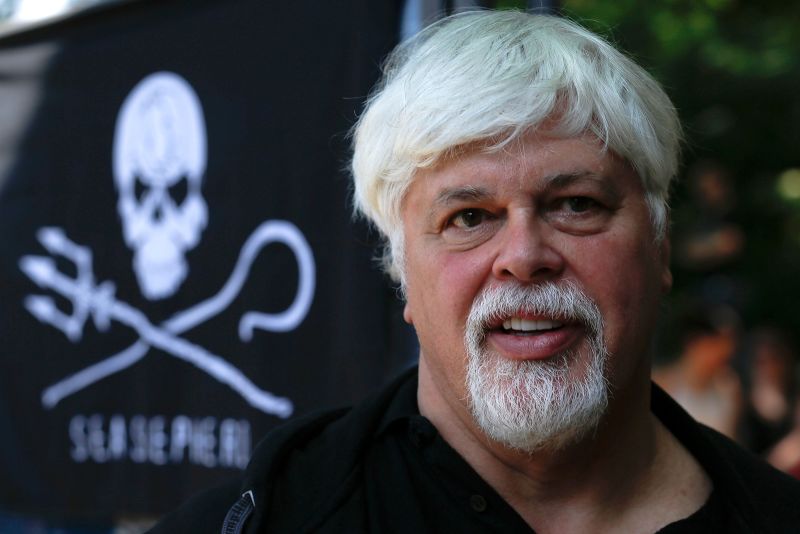
Veteran anti-whaling activist Paul Watson could be extradited to Japan after arrest in Greenland, his foundation says
Veteran environmentalist Paul Watson was arrested in Greenland on Sunday and faces possible extradition to Japan allegedly over anti-whaling activities in the Antarctic years ago, his organization said in a statement.
The 73-year-old Canadian-American dual national was detained by police when his ship docked in the Greenland capital Nuuk to refuel, according to the Captain Paul Watson Foundation (CPWF) and Greenland police.
The ship John Paul DeJoria and a 25-member crew were en route from Dublin, Ireland to the North Pacific to intercept Japan’s newly launched $48 million factory whaling ship the Kangei Maru, CPWF said.
“We were immediately boarded by a SWAT team and … police who wasted no time in cuffing Paul Watson, our founder, and arresting him on a decades old Red Notice at the request of Japan,” Ship Operations Director Locky MacLean said in a video message onboard the John Paul DeJoria.
Police can be seen boarding the vessel and leading Watson away in handcuffs in the video.
In a statement, Greenland police said they arrested Watson upon his arrival in Nuuk due to a Japanese arrest warrant. He will be brought before a district court with a request to detain him while a decision is made on his possible extradition to Japan, police added.
His foundation believes the arrest “is connected to a previous Red Notice issued for Watson’s anti-whaling activities in the Antarctic.”
“This development comes as a surprise since the Foundation’s lawyers had reported that the Red Notice had been withdrawn. However, it appears that Japan had made the notice confidential to facilitate Paul’s travel for the purpose of making an arrest,” the statement continued.
CPWF said it “believes the reactivation of the Red Notice against Captain Watson is politically motivated, coinciding with the launch of the new factory ship.”
An early member of Greenpeace, Watson went on to found the Sea Shepherd Conservation Society, an environmental group famous for tracking, exposing and occasionally ramming Japanese whalers. His attempts to disrupt Japanese whalers at sea gained him fame through Animal Planet’s “Whale Wars” TV show.
His activities have also previously landed him in legal trouble. In 2012, he was detained in Germany on an international arrest warrant issued by Costa Rica, which accused him of endangering a fishing vessel off the coast of Guatemala in 2002. He skipped bail but denied wrongdoing in that case.
In 2013, the Japan’s Institute of Cetacean Research and the Japanese firm Kyodo Senpaku Kaisha secured a US District Court injunction against Watson and Sea Shepherd, which prohibited him and his group from coming within 500 yards of the plaintiffs on the open sea.
Due to the injunction, Watson resigned as president and executive director of the conservation society in the United States and as president of the society in Australia.
In June, Kyodo Senpaku launched a brand-new whaling “mothership” – the Kangei Maru – a 370-foot, 9,300-ton vessel equipped with state-of-the-art drones able to travel a reported 100 kilometers (62 miles) to allow crews to quickly locate and kill whales.
The new ship replaces the Nisshin Maru, the infamous whaling factory vessel dubbed by activists as a “floating slaughterhouse” that was decommissioned in 2020 after more than 30 years of service, during which it frequently clashed with anti-whaling activists.
Japan is one of three countries, along with Norway and Iceland, that continues to hunt whales, and officials argue that the industry is an important part of its culture and history – and also provides food security.
The Kangei Maru boasts a slipway large enough to haul 85-foot whales from the sea that leads to an indoor flensing deck the size of two basketball courts.
There, workers will strip away the blubber before cutting up the whale flesh on enormous cutting boards, before vacuum-packing and storing the meat in 40 industrial freezers, ready for sale.
Commercial whaling was banned under a 1986 International Whaling Commission moratorium. But Japan has used a loophole to continue hunting whales legally for what it claims is scientific research.
In 2018, it announced its withdrawal from the IWC and resumed commercial whaling months later in defiance of international criticism.
“We are proud of catching whales and are very proud of this ship which will allow us to begin offshore mothership-style whaling this year,” Tokoro told reporters in June.
